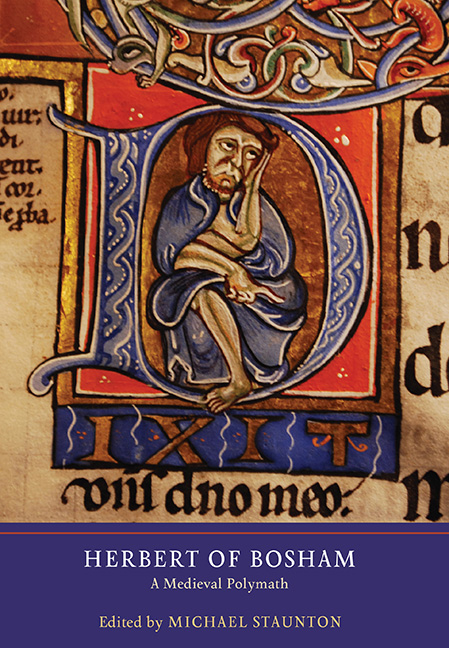Book contents
- Frontmatter
- Contents
- List of Illustrations
- List of Contributors
- Editorial Preface
- List of Abbreviations
- 1 An Introduction to Herbert of Bosham
- 2 Master Herbert: Becket's eruditus, Envoy, Adviser, and Ghost-writer?
- 3 Herbert of Bosham and Peter Lombard
- 4 Pages Covered with as Many Tears as Notes: Herbert of Bosham and the Glossed Manuscripts for Thomas Becket
- 5 Scholarship as a Weapon: Herbert of Bosham's Letter Collection
- 6 Time, Change and History in Herbert of Bosham's Historia
- 7 John Allen Giles and Herbert of Bosham: The Criminous Clerk as Editor
- 8 The Missing Leaves of Arras MS 649: A Tale of Lost and Found
- 9 Encounters with Herbert of Bosham
- Appendix: A New Letter of Herbert of Bosham (1175 x 1178)
- Select Bibliography
- Index
2 - Master Herbert: Becket's eruditus, Envoy, Adviser, and Ghost-writer?
Published online by Cambridge University Press: 26 March 2019
- Frontmatter
- Contents
- List of Illustrations
- List of Contributors
- Editorial Preface
- List of Abbreviations
- 1 An Introduction to Herbert of Bosham
- 2 Master Herbert: Becket's eruditus, Envoy, Adviser, and Ghost-writer?
- 3 Herbert of Bosham and Peter Lombard
- 4 Pages Covered with as Many Tears as Notes: Herbert of Bosham and the Glossed Manuscripts for Thomas Becket
- 5 Scholarship as a Weapon: Herbert of Bosham's Letter Collection
- 6 Time, Change and History in Herbert of Bosham's Historia
- 7 John Allen Giles and Herbert of Bosham: The Criminous Clerk as Editor
- 8 The Missing Leaves of Arras MS 649: A Tale of Lost and Found
- 9 Encounters with Herbert of Bosham
- Appendix: A New Letter of Herbert of Bosham (1175 x 1178)
- Select Bibliography
- Index
Summary
The eruditus
HERBERT of Bosham is a first-hand witness of the whole of Becket's career from the chancellorship to his canonisation, excepting only the martyrdom itself. Yet this awkward, courageous, challenging theologian, formed in the Parisian schools and enquiring enough to learn and use Hebrew to considerable effect, is hard to fit into the eruditi about whom he left those tantalising thumbnail sketches in his catalogus. Herbert saw the eruditi in biblical terms. The catalogus eruditorum was modelled on the list of King David's mighty warriors (nomina fortium) at the end of the second Book of Kings (2 Sam.), who were described in the First Book of Chronicles as ‘the leaders of King David's powerful men, who helped him maintain his rule over all of Israel in accordance with the Lord's word that was spoken to Israel’. David's warriors had been strong in arms, but Becket's eruditi were powerful in writing (scripturis), their mission to defend the God-given authority of their ‘David’. Herbert's view of the role of the archbishop's familia was thus informed by stirring images from the heroic history of Israel. Like David's fearless warriors, the eruditi stood valiantly beside Christ's champion (Domini/Christi/athleta) in the fight for God's law.
Not all the warriors were equal, however. Herbert's conviction that theology, and especially the study of sacred scripture, was the superior science led him to express a distinct coolness towards the ‘the crowd (turba) of men learned in public law (in iure forensi)’, which the archbishop always had about him for secular disputes (ad seculi jurgia). These employed ‘not theological, but a kind of civic eloquence’, or, to put it more directly, ‘not Godly eloquence, but the language of the town’. ‘There is nothing between them and me’, wrote Herbert, possibly echoing Tertullian's famous words, ‘nor, indeed, do they share this fellowship (mensa). Different is their profession; different their fellowship’. There was thus a certain ambivalence in his attitude to the eruditi, of whom at least six were legal specialists, and there was a seventh, William Fitzstephen, the later biographer of Becket, whom Herbert ignored completely. One suspects that Herbert was not entirely at home with his new colleagues, whose expertise was so different from his own.
- Type
- Chapter
- Information
- Herbert of BoshamA Medieval Polymath, pp. 29 - 54Publisher: Boydell & BrewerPrint publication year: 2019



